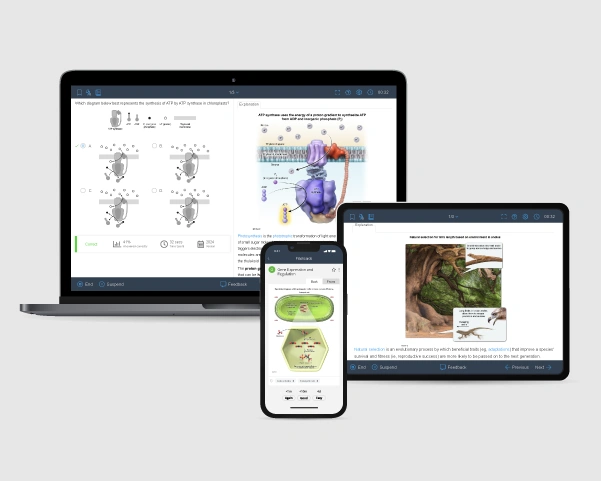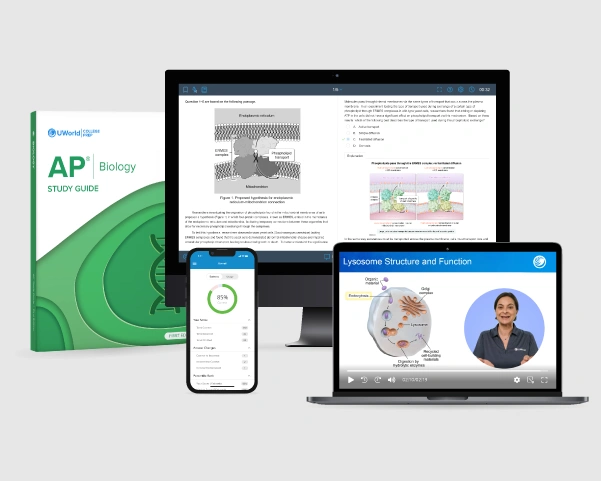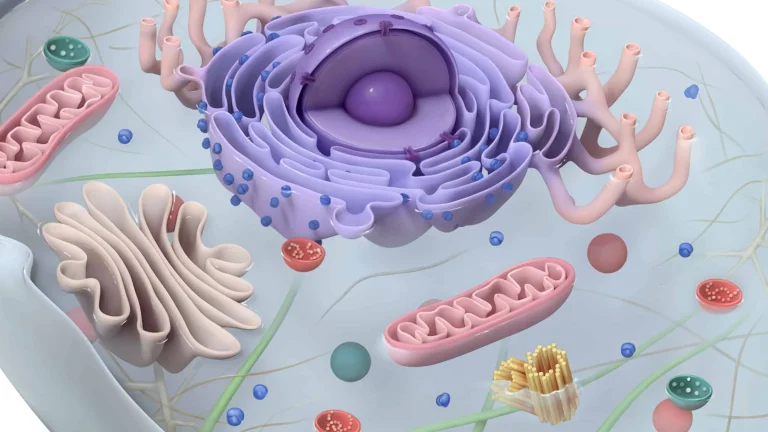Hands-on labs in AP science classes help you develop essential skills for exams and real-life scientific thinking. Preparing lab reports teaches effective communication, a key component in the scientific process. We’ve compiled a comprehensive list of AP Biology labs along with essential materials and tips to support you in class and on the AP exam.
Why are AP Biology Labs Important?
The AP Biology curriculum develops your understanding of biology, scientific reasoning, and quantitative skills. The College Board® mandates that AP Biology teachers spend at least 25% of instructional time on lab investigations. A minimum of 8 labs — with 2 covering each of the four main ideas of evolution, energetics, information storage and transmission, and system interactions — are required.
The AP Biology lab manual includes 13 inquiry-based labs, providing valuable practice in experimental design, data analysis, and scientific explanations. These labs evaluate scientific practice skills and content knowledge to help you prep for the AP Biology exam. Take your preparation to the next level with our AP Biology Practice Tests to reinforce key concepts and test your readiness.
AP Biology Lab Materials
The equipment and materials required for AP Biology lab investigations are similar to those used in high school biology courses. However, access to some specialized equipment such as gel electrophoresis systems and spectrophotometers may be needed to conduct certain investigations.
What labs are in AP Biology?
The AP Biology lab manual includes 13 inquiry-based lab investigations aligned with the AP Biology curriculum framework. Your teachers may substitute other labs that are inquiry-based and cover content within the curriculum framework as long as a minimum of 2 labs are done for each of the 4 big ideas in AP Biology.
The following 13 labs from the manual are grouped by big idea:
Evolution
The process of evolution explains the unity of life as well as its diversity.

Design and carry out an experiment using Wisconsin Fast Plants®. After collecting and analyzing data on plant characteristics over 2 generations, you will explain the effect humans had on the diversity of the plant population and the relationship between environmental changes and evolutionary changes. This lab provides practice in measuring, counting, and conducting statistical analysis of data, as well as describing data in tables and graphs.
Create a computer spreadsheet to model allele frequencies in a hypothetical gene pool over time. You will analyze how various conditions affect allele and genotype frequencies in a population and discuss the implications when Hardy-Weinberg equilibrium conditions are not met. This lab provides practice in using spreadsheet software and conducting mathematical calculations based on Hardy-Weinberg equilibrium equations.
Utilize the BLAST tool to analyze DNA sequences from an animal fossil. You will determine the animal's evolutionary relationship to other organisms and create a cladogram to represent these relationships. You also will discuss how molecular variation impacts survival and reproduction abilities within organisms.
Energetics
Living systems use energy and molecules to grow, produce offspring, and maintain homeostasis.
Create artificial cells to study diffusion and predict diffusion rates based on surface area-to-volume ratios. You will observe osmosis in plant cells, calculating water potential. You also will explain how concentration gradients influence molecule movement across membranes and how surface area-to-volume ratio impacts this process. This lab provides practice in mathematical calculations and graph-making in a biological context.
Design an experiment to assess an environmental variable's impact on photosynthesis rate. You will explain the photosynthesis process and how cells capture light energy to produce energy-containing molecules. This lab provides practice in calculating rates, graphing data, and substantiating scientific claims with experimental evidence.
Measure cellular respiration rate using a respirometer and design an experiment to determine how an environmental variable affects the rate of respiration. You will describe and explain processes by which organisms extract and use energy from biological molecules to power cellular processes. This lab provides practice in graphing data, calculating rates, and explaining how experimental evidence supports a scientific claim.
Information Storage and Transmission
Living systems store, access, send, and react to information necessary for life.
Explore mitosis and meiosis with physical chromosome models, study lectin protein impacts on mitosis rates in onion root tip cells, and examine human karyotypes to understand cancer's link to cell cycle control loss. You will investigate crossing over in meiosis using Sordaria fimicola strains and describe cell cycle events, explain chromosome transmission in mitosis and meiosis, and compare the processes. This lab provides practice in data description, graphical analysis, and chi-square analysis.
Conduct an experiment involving the transformation of bacteria via the uptake of plasmids containing an antibiotic resistance gene. You will gain experience using a genetic engineering technique to manipulate DNA and learn how your experimental results relate to larger biological ideas.
Use restriction enzymes and electrophoresis to analyze DNA evidence from a simulated crime scene. You will explain how biotechnology techniques are used to manipulate and analyze DNA. This lab provides practice in graphing data using a log scale and using a standard curve to estimate experimental results.
System Interactions
Biological systems have complex properties and interact with each other in complex ways.
Grow Wisconsin Fast Plants® (Brassica rapa) to study their net primary productivity. You will analyze energy flow from plants to butterfly larvae. You also will describe energy acquisition and utilization by organisms, the impact of energy availability on populations and ecosystems, and the roles of autotrophs and heterotrophs. You’ll discuss how molecular diversity influences survival and reproduction. This lab provides practice in justifying claims with biological theories and experimental evidence and relating data to broader scientific concepts.
Measure plant transpiration rates with a potometer and investigate how environmental factors influence transpiration. You will discuss organism responses to environmental changes and their impact on fitness. This lab provides practice in mathematical calculations, graphing, and selecting suitable procedures for biological investigations.
Observe fruit fly behavior in response to various chemical stimuli. You will discuss how organism behaviors relate to environmental changes and impact fitness. You also will explain how population density affects resource availability. This lab provides practice in aligning experimental procedures with scientific questions and using the chi-square test for data analysis.
Measure enzyme-catalyzed reaction rates and assess pH's effect on enzyme activity. You will design experiments to explore additional variables' impact on enzyme activity. You also will explain how enzyme structure changes affect activity and how environmental changes influence enzyme function. You’ll discuss how molecular diversity within cells relates to survival and reproduction in diverse environments. This lab provides practice in using scientific reasoning to justify claims and predicting biological system changes.
To ensure thorough preparation for these labs and beyond, our AP Biology online prep course offers targeted practice and in-depth explanations tailored to AP Biology students.
The more experience you have doing labs aligned with the AP Biology curriculum framework, the better prepared you will be for the AP Biology exam.
Get a comprehensive AP Bio study plan with expert-crafted resources designed to help you excel. Our AP Biology Study Guide, available in both print and digital formats, offers in-depth explanations, visually engaging illustrations, and strategic tips for mastering key concepts. Whether you need a quick review or detailed topic breakdowns, this guide simplifies complex concepts, enhances retention, and ensures you have everything you need to boost your confidence and maximize your score on exam day. Start preparing smarter today!
References
- (2024). Hands-On Labs. AP Biology. AP Central Retrieved January 02, 2025 from
https://apcentral.collegeboard.org/courses/ap-biology/course-audit - (2019). Investigations. AP® BIOLOGY INVESTIGATIVE LABS: An Inquiry-Based Approach. AP Central Retrieved January 02, 2025 from
https://apcentral.collegeboard.org/media/pdf/ap-biology-teacher-lab-manual-effective-fall-2019_1.pdf

Related Topics
Knowing how to write an AP Biology lab report can help you ace the exam and think like a scientist. View our step-by-step guide to begin thinking like a scientist!
AP Biology Course and Exam DescriptionLooking for an easy-to-follow guide on AP Bio? Check out our curriculum overview for detailed insights into the units, topics, and key concepts covered in the course.
About AP Biology ExamPlanning to take the AP Biology exam? Get a headstart by exploring what the exam is equivalent to, who can take the exam, its benefits, and other essential details.
How to Self-Study for AP BiologyLearn effective tips and strategies to self-study for the AP Biology exam. Build confidence, master core concepts, and achieve a high score independently too.
Best AP Biology Prep Course ReviewWondering which AP Biology prep course is the best? Check out this detailed review to find the right course for your exam prep.
Best AP Biology Study Guide ComparisonDiscover expert insights into Kaplan, Barron's, Princeton Review, and UWorld. Learn how each resource compares to help you choose the best fit.



